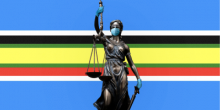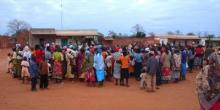East and Horn of Africa Paralegals Network (EAHPN) Annual Forum
Paralegal networks play a critical role in establishing a link between the informal and formal justice systems in the East and Horn of Africa.


Uganda has made much progress in reducing poverty and promoting stability in past years, particularly through improvements on several justice-related indicators. Despite these gains, the justice sector still faces significant challenges relating to funding and capacity, public perceptions of pervasive corruption, inaccessibility of services for the poor sections of the population, low quality and sustainability of the legal aid and information services, costliness and slow speeds of dispute resolution, among others. These challenges have negatively affected citizens’ confidence in the formal system leading people to resort to other means to seek recourse and may also increase the likelihood of violence and further corruption. There is a therefore a need for effective interventions to enhance the reach, quality and sustainability of access to justice in Uganda.
Paralegal networks play a critical role in establishing a link between the informal and formal justice systems in the East and Horn of Africa.

The COVID-19 pandemic poses a significant threat to the right to food for populations, and especially for marginalized groups. In many countries, COVID-19 is intertwining with pre-existing factors affecting food security and nutrition, by limiting the access to affordable and nutritious food, including lack of economic opportunities, extreme weather conditions, ongoing conflicts and more.
REGIONAL WEBINAR
Access to Justice in the Context of COVID-19 in East Africa: Experiences from Kenya, Uganda, Tanzania and Rwanda

IDLO is rolling out a program that aims to secure accessible, quality and sustainable justice services for citizens - particularly those living in rural, poor and other disadvantaged communities. The Community Justice Programme (CJP) supports both state and non-state legal aid, legal empowerment and other justice delivery interventions.
IDLO is implementing a project in Uganda and four other countries that aims to strengthen national capacity to promote healthy diets and increase physical activity for the prevention of non-communicable diseases (NCDs). Program activities focus on capacity building for more effective regulatory and fiscal interventions, supporting the development and use of relevant research, and convening multi-stakeholder dialogues and collaboration between civil societ
IDLO is rolling out a program that aims to secure accessible, quality and sustainable justice services for citizens - particularly those living in rural, poor and other disadvantaged communities. The Community Justice Programme (CJP) supports both state and non-state legal aid, legal empowerment and other justice delivery interventions.
East Africa Regional Forum - Alternative Dispute Resolution & Customary and Informal Justice: Advancing SDG16 and Pathways to Justice

In 1984, while working as a State Attorney at the Ugandan Ministry of Justice, Fredrick Ruhindi had the opportunity to come to Rome and spend three months as a participant at IDLI’s very first ‘Development Lawyers Course’ – a 12-week course providing intensive training on legal skills such as advising, negotiating, draft





|
Évènement
10 mai, 2021 |